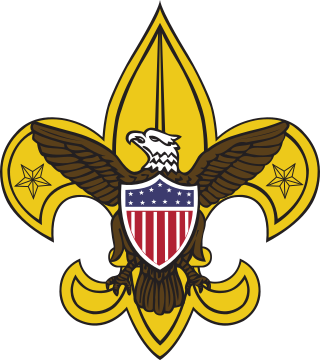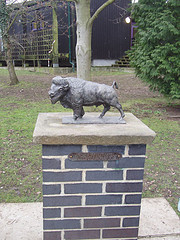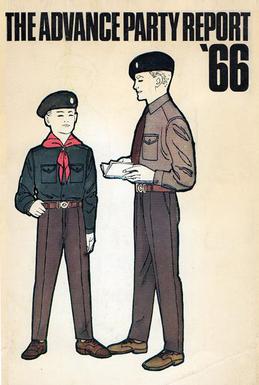
Scouting, also known as the Scout Movement, is a worldwide youth social movement employing the Scout method, a program of informal education with an emphasis on practical outdoor activities, including camping, woodcraft, aquatics, hiking, backpacking, and sports. Another widely recognized movement characteristic is the Scout uniform, by intent hiding all differences of social standing in a country and encouraging equality, with neckerchief and campaign hat or comparable headwear. Distinctive uniform insignia include the fleur-de-lis and the trefoil, as well as merit badges and other patches.

Lieutenant-General Robert Stephenson Smyth Baden-Powell, 1st Baron Baden-Powell, was a British Army officer, writer, founder and first Chief Scout of the world-wide Scout Movement, and founder, with his sister Agnes, of the world-wide Girl Guide/Girl Scout Movement. Baden-Powell authored the first editions of the seminal work Scouting for Boys, which was an inspiration for the Scout Movement.

Founded in 1908, The Scout Association of Malta (TSAM) is the Scouting organization in Malta. TSAM has always maintained a high and respectable Scouting tradition. Its leaders and members are committed to further the ideals of Scouting in line with those as traditionally established by the youth movement's Founder, Lord Robert Baden-Powell of Gilwell, and as further developed by the World Organization of the Scout Movement (WOSM). TSAM is a forward looking youth movement which, as a non-governmental organisation (NGO), enjoys great respect both locally and internationally. It is the only association in Malta which is recognised by the WOSM, and is also a member of the European Scout Region.

The Order of World Scouts (OWS), founded in 1911, is the oldest international Scouting organisation. It is headquartered in England, with the administration headquarters in Italy.

The Bangladesh Scouts is the national Scouting organization of Bangladesh. Now The Chief Scout of Bangladesh is Mohammed Shahabuddin. Scouting was founded in 1914 in East Bengal, now Bangladesh, as part of the British Indian branch of The Scout Association, and continued as part of the Pakistan Boy Scouts Association until the country's divided sections split in 1971 during the Bangladesh Liberation War. Following its independence, in 1972, the Bangladesh Boy Scout Association was officially formed as successor of the Pakistan Boy Scouts Association. Bangladesh became an independent member of the World Organization of the Scout Movement in 1974. The organization changed its name to "Bangladesh Scouts" in 1978. The organization has 2,261,351 members as of 2021.

William Hillcourt, known within the Scouting movement as "Green Bar Bill", was an influential leader in the Boy Scouts of America (BSA) organization from 1927 to 1992. Hillcourt was a prolific writer and teacher in the areas of woodcraft, troop and patrol structure, and training; his written works include three editions of the BSA's official Boy Scout Handbook, with over 12.6 million copies printed, other Scouting-related books and numerous magazine articles. Hillcourt developed and promoted the American adaptation of the Wood Badge adult Scout leader training program.
Traditional Scouting is "old-fashioned" or "back to basics" Scouting in some form, often with an emphasis on woodcraft and scoutcraft activities. As a pluralist movement, there is no one set definition for the term, but most traditionalists share a common set of values and procedures. Traditionalists aim to return the Scout Movement to something approximating its original style and activities; rejecting the trend of modernizing the program in an attempt to widen its appeal and/or use the name "Scouts" for new programs for ever-younger children.

James Edward West was a lawyer and an advocate of children's rights, who became the first professional Executive Secretary, soon renamed Chief Scout Executive, of the Boy Scouts of America (BSA), serving from 1911 to 1943. Upon his retirement from the BSA, West was given the title of Chief Scout.

The Scout method is the informal educational system used in the Scouting Movement. The aim of Scouting is character training with the goal of helping participants become independent and helpful, and thereby become "healthy, happy, helpful citizens".

Scouts BSA is the flagship program and membership level of the Boy Scouts of America (BSA) for boys and girls between the ages of typically 11 and 17. It provides youth training in character, citizenship, and mental and personal fitness. Scouts are expected to develop personal religious values, learn the principles of American heritage and government, and acquire skills to become successful adults.

The Pathfinder & Rover Explorer Scouts' Association (P-RESA) is an independent Traditional Scouting Association in the United Kingdom, with International branches. The Association's training programme runs along the lines of Baden-Powell's original Scouting for Boys, upholding the traditions and practices set out by B-P, using the 1938 Boy Scouts' Association Policy Organisation & Rules (POR) as its basis.

The Boy Scouts of America (BSA) was inspired by and modeled on The Boy Scouts Association, established by Robert Baden-Powell in Britain in 1908. In the early 1900s, several youth organizations were active, and many became part of the BSA.

There are various controversies and conflicts that involve the Scouting movement. Scouting has sometimes become entangled in social controversies such as in nationalist resistance movements in India. Scouting was introduced to Africa by British officials as an instrument of colonial authority but became a subversive challenge to the legitimacy of British imperialism as Scouting fostered solidarity amongst African Scouts. There are also controversies and challenges within the Scout Movement itself such as current efforts to turn Scouts Canada into a democratic organization.
The Scout and Guide movement in Malta is served by three organizations:

The advancement program for Scouts participating in the Scouts BSA program of the Boy Scouts of America is symbolized by the earning of seven ranks. The advancement program is often considered to be divided into two phases. The first phase from joining to First Class is designed to teach the scout Scoutcraft skills, how to participate in a group and to learn self-reliance. The Scout badge is awarded when the Scout demonstrates a rudimentary knowledge of the Scouting ideals and program. Tenderfoot, Second Class, and First Class have progressively harder requirements in the areas of Scoutcraft, physical fitness, citizenship, personal growth and Scout Spirit.

The 'Unknown Scout' was an anonymous member of The Boy Scout Association in the United Kingdom whose good turn inspired William D. Boyce to form the Boy Scouts of America (BSA).

The Boy Scouts Association's The Chief Scout's Advance Party Report 1966 attempted to address the association's falling enrollment numbers and modernise its programs. It resulted in changes to traditional iconic uniforms, changes to awards, training schemes, the association's name and other nomenclature, reduced distinctions between Cubs and Scouts and discontinuation of Rovers. However, the changes failed to halt decline in older enrolments, resulting in a shift to younger ages and also resulted in disaffection, a schism in the organisation, growth of the alternate British Boy Scouts and European Scout Federation, formation of independent Scout groups and further alternate Scout organisations, particularly the Traditional Scouting Baden-Powell Scouts' Association and helped to re-establish understanding of Scouts as a movement rather than a single organisation.

In the Boy Scouts of America, a Scout leader refers to the trained leaders of a Scout unit. Adult leaders are generally referred to as "Scouters," and the youth leaders are referred to by their position within a unit. In all Scouting units above the Cub Scout pack and units serving adolescent Scouts, leadership of the unit comprises both adult leaders (Scouters) and youth leaders (Scouts). This is a key part of the Aims and Methods of Scouting. In order to learn leadership, the youth must actually serve in leadership roles.

















